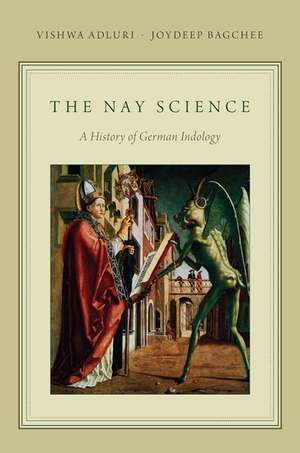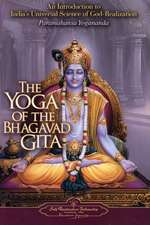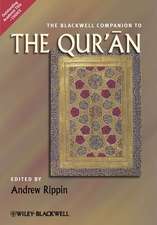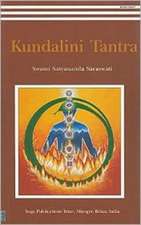The Nay Science: A History of German Indology
Autor Vishwa Adluri, Joydeep Bagcheeen Limba Engleză Paperback – 24 iul 2014
| Toate formatele și edițiile | Preț | Express |
|---|---|---|
| Paperback (1) | 367.34 lei 32-37 zile | |
| Oxford University Press – 24 iul 2014 | 367.34 lei 32-37 zile | |
| Hardback (1) | 837.95 lei 32-37 zile | |
| Oxford University Press – 24 iul 2014 | 837.95 lei 32-37 zile |
Preț: 367.34 lei
Preț vechi: 418.91 lei
-12% Nou
Puncte Express: 551
Preț estimativ în valută:
70.31€ • 73.12$ • 58.92£
70.31€ • 73.12$ • 58.92£
Carte tipărită la comandă
Livrare economică 03-08 martie
Preluare comenzi: 021 569.72.76
Specificații
ISBN-13: 9780199931361
ISBN-10: 0199931364
Pagini: 512
Ilustrații: black & white illustrations, black & white tables, charts
Dimensiuni: 231 x 150 x 38 mm
Greutate: 0.64 kg
Editura: Oxford University Press
Colecția OUP USA
Locul publicării:New York, United States
ISBN-10: 0199931364
Pagini: 512
Ilustrații: black & white illustrations, black & white tables, charts
Dimensiuni: 231 x 150 x 38 mm
Greutate: 0.64 kg
Editura: Oxford University Press
Colecția OUP USA
Locul publicării:New York, United States
Recenzii
[A]n important work of hermeneutic analysis
The Nay Science is arguably one of most comprehensive historiographies of Indology, assessing the fields philosophical roots and the implications it has had on both academic and practical discourses about Hinduism and other Indian classical traditions The Nay Science (a clever play on nescience, or ignorance) speaks to the institutional antagonism of 19th and early 20th century German Indologists towards ancient Indian scriptures, subsequently shaping a paradigm from which many Indologists continue to draw. Their assertion, backed by correspondences between Indologists and their own published works, is not so much a critique of Orientalism as it is a surgical evisceration of the scholarly field that has developed over nearly two centuries.
The Nay Science is more than a history of German Indology. Besides offering a highly nuanced critique of scientific positivism and historicism, it makes important interventions in broader debates on the development of the social and human sciences in nineteenth- and twentieth-century Germany, and has much to say regarding the role of race and religion in the formation of German national identity. Last but not least, The Nay Science contributes greatly to our understanding of the origins, nature, and consequences of German orientalism. While the non specialist reader might find this ambitious work daunting in its depth, breadth, and complexity, the authors have produced a remarkable work of scholarship.
The Nay Science concludes with some exciting and discomforting questions: How should we navigate and negotiate apparent antitheses: 'modern' and 'traditional,' 'reason' and 'faith'? What pragmatic concerns and consequences should inform our scholarship, such that the humanities can truly humanize us? These questions are key to a critical reorientation, toward thinking about India 'after Indology.'
Adluri and Bagchee eschew the shooting-fish-in-a-barrel exercise of excoriating nineteenth-century European scholars for their sins and instead conclude by drawing some lessons from Gadamer and Gandhi on the benefits of an alternative philosophical philology. The points the authors make are relevant to historians of religion no matter what discipline they study.
[The Nay Science] adds significantly to the many recent studies of Orientalism ... Highly recommended.
This book begins at a point where Edward Said left off. Rather than replicate the 'Orientalist' critique as so many have done, Adluri and Bagchee offer a diagnosis of German Indology as a form of 'Occidentalism': rather than accomplishing its stated goal of defining the other (which would be 'Orientalism'), it represents the other so as to define itself The Nay Science challenges scholars to recognize that the 'Brahmanic hypothesis' was not and probably no longer can be an innocuous thesis. The 'corrupting' impact of Brahmanical 'priestcraft' served German Indology as a cover by which to talk about Catholics, Jews, and other 'Semites.
If ever there is a fine specimen of how to do the in-depth history of ideas as it pertains to an academic discipline, this study by Vishwa Adluri and Joydeep Bagchee ranks very, very highly.
The Nay Science is arguably one of most comprehensive historiographies of Indology, assessing the fields philosophical roots and the implications it has had on both academic and practical discourses about Hinduism and other Indian classical traditions The Nay Science (a clever play on nescience, or ignorance) speaks to the institutional antagonism of 19th and early 20th century German Indologists towards ancient Indian scriptures, subsequently shaping a paradigm from which many Indologists continue to draw. Their assertion, backed by correspondences between Indologists and their own published works, is not so much a critique of Orientalism as it is a surgical evisceration of the scholarly field that has developed over nearly two centuries.
The Nay Science is more than a history of German Indology. Besides offering a highly nuanced critique of scientific positivism and historicism, it makes important interventions in broader debates on the development of the social and human sciences in nineteenth- and twentieth-century Germany, and has much to say regarding the role of race and religion in the formation of German national identity. Last but not least, The Nay Science contributes greatly to our understanding of the origins, nature, and consequences of German orientalism. While the non specialist reader might find this ambitious work daunting in its depth, breadth, and complexity, the authors have produced a remarkable work of scholarship.
The Nay Science concludes with some exciting and discomforting questions: How should we navigate and negotiate apparent antitheses: 'modern' and 'traditional,' 'reason' and 'faith'? What pragmatic concerns and consequences should inform our scholarship, such that the humanities can truly humanize us? These questions are key to a critical reorientation, toward thinking about India 'after Indology.'
Adluri and Bagchee eschew the shooting-fish-in-a-barrel exercise of excoriating nineteenth-century European scholars for their sins and instead conclude by drawing some lessons from Gadamer and Gandhi on the benefits of an alternative philosophical philology. The points the authors make are relevant to historians of religion no matter what discipline they study.
[The Nay Science] adds significantly to the many recent studies of Orientalism ... Highly recommended.
This book begins at a point where Edward Said left off. Rather than replicate the 'Orientalist' critique as so many have done, Adluri and Bagchee offer a diagnosis of German Indology as a form of 'Occidentalism': rather than accomplishing its stated goal of defining the other (which would be 'Orientalism'), it represents the other so as to define itself The Nay Science challenges scholars to recognize that the 'Brahmanic hypothesis' was not and probably no longer can be an innocuous thesis. The 'corrupting' impact of Brahmanical 'priestcraft' served German Indology as a cover by which to talk about Catholics, Jews, and other 'Semites.
If ever there is a fine specimen of how to do the in-depth history of ideas as it pertains to an academic discipline, this study by Vishwa Adluri and Joydeep Bagchee ranks very, very highly.
Notă biografică
Vishwa Adluri has a PhD in Philosophy from the New School and a PhD in Indology from Philipps-Universität Marburg. He is Adjunct Associate Professor of Religion at Hunter College.; Joydeep Bagchee has a PhD in Philosophy from the New School and is Wissenschaftlicher Mitarbeiter at Freie Universität Berlin.










